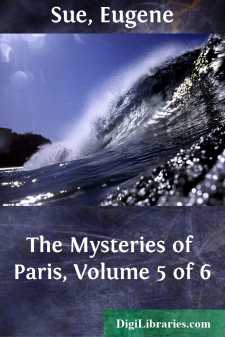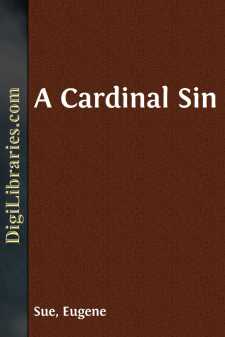Categories
- Antiques & Collectibles 13
- Architecture 36
- Art 48
- Bibles 22
- Biography & Autobiography 815
- Body, Mind & Spirit 144
- Business & Economics 28
- Children's Books 18
- Children's Fiction 14
- Computers 4
- Cooking 94
- Crafts & Hobbies 4
- Drama 346
- Education 58
- Family & Relationships 59
- Fiction 11835
- Games 19
- Gardening 17
- Health & Fitness 34
- History 1378
- House & Home 1
- Humor 147
- Juvenile Fiction 1873
- Juvenile Nonfiction 202
- Language Arts & Disciplines 89
- Law 16
- Literary Collections 686
- Literary Criticism 179
- Mathematics 13
- Medical 41
- Music 40
- Nature 180
- Non-Classifiable 1768
- Performing Arts 7
- Periodicals 1453
- Philosophy 65
- Photography 2
- Poetry 896
- Political Science 203
- Psychology 44
- Reference 154
- Religion 515
- Science 126
- Self-Help 85
- Social Science 83
- Sports & Recreation 34
- Study Aids 3
- Technology & Engineering 59
- Transportation 23
- Travel 463
- True Crime 29
Eugene Sue
Eugene Sue was a 19th-century French novelist best known for his works of social criticism and serialized novels, particularly "The Mysteries of Paris" (1842-1843) and "The Wandering Jew" (1844-1845). His writings, characterized by their vivid portrayals of the struggles of the urban poor, were immensely popular and influential in shaping public opinion and social reform movements in France. Sue's novels often combined melodrama with detailed depictions of contemporary life, earning him a lasting place in the annals of French literature.
Author's Books:
Sort by:
by:
Eugene Sue
THE WANDERING JEW'S SENTENCE. The site is wild and rugged. It is a lofty eminence covered with huge boulders of sandstone, between which rise birch trees and oaks, their foliage already yellowed by autumn. These tall trees stand out from the background of red light, which the sun has left in the west, resembling the reflection of a great fire. From this eminence the eye looks down into a deep...
more...
by:
Eugene Sue
CHAPTER I. THE PRESENTATION. A few days after the murder of Madame Séraphin, the death of the Chouette, and the arrest of the gang of desperadoes taken by surprise at Bras-Rouge's house, Rodolph paid another visit to the house in the Rue du Temple. We have already observed that, with the view of practising artifice for artifice with Jacques Ferrand, discovering his hidden crimes, obliging him to...
more...
by:
Eugene Sue
CHAPTER I. THE TAPIS-FRANC. It was on a cold and rainy night, towards the end of October, 1838, that a tall and powerful man, with an old broad-brimmed straw hat upon his head, and clad in a blue cotton carter's frock, which hung loosely over trousers of the same material, crossed the Pont au Change, and darted with a hasty step into the Cité, that labyrinth of obscure, narrow, and winding...
more...
by:
Eugene Sue
THE EAST INDIAN IN PARIS. Since three days, Mdlle. de Cardoville had left Dr. Baleinier's. The following scene took place in a little dwelling in the Rue Blanche, to which Djalma had been conducted in the name of his unknown protector. Fancy to yourself a pretty, circular apartment, hung with Indian drapery, with purple figures on a gray ground, just relieved by a few threads of gold. The ceiling,...
more...
by:
Eugene Sue
About two hours before the event last related took place at St. Mary's Convent, Rodin and Abbe d'Aigrigny met in the room where we have already seen them, in the Rue du Milieu-des-Ursins. Since the Revolution of July, Father d'Aigrigny had thought proper to remove for the moment to this temporary habitation all the secret archives and correspondence of his Order—a prudent measure,...
more...
by:
Eugene Sue
CHAPTER I. THE TEMPLE. To the deep snow which had fallen during the past night had succeeded a very sharp wind, so that the ordinarily muddy pavement was hard and dry, as Rigolette and Rodolph wended onwards to the immense and singular bazar called the Temple, the young girl leaning unceremoniously on the arm of her cavalier, who, on his part, appeared as much at his ease as though they had been old...
more...
by:
Eugene Sue
During the preceding scenes which occurred in the Pompadour rotunda, occupied by Miss de Cardoville, other events took place in the residence of the Princess Saint-Dizier. The elegance and sumptuousness of the former dwelling presented a strong contrast to the gloomy interior of the latter, the first floor of which was inhabited by the princess, for the plan of the ground floor rendered it only fit for...
more...
by:
Eugene Sue
CHAPTER I. ARAIM. Occasionally they are long-lived, these descendants of the good Joel, who, five hundred and fifty years ago and more lived in this identical region, near the sacred stones of the forest of Karnak. Yes, the descendants of the good Joel are, occasionally, long-lived, seeing that I, Araim, who to-day trace these lines in the seventy-seventh year of my life, saw my grandfather Gildas die...
more...
by:
Eugene Sue
PROLOGUE.—THE BIRD'S-EYE VIEW OF TWO WORLDS. As the eagle, perched upon the cliff, commands an all-comprehensive view—not only of what happens on the plains and in the woodlands, but of matters occurring upon the heights, which its aerie overlooks, so may the reader have sights pointed out to him, which lie below the level of the unassisted eye. In the year 1831, the powerful Order of the...
more...
by:
Eugene Sue
A CARDINAL SIN. CHAPTER I. On a beautiful, bright morning of the month of May, 18—, a young girl of eighteen years or thereabouts, whose pale, melancholy face reflected only too plainly the wretchedness and privations of her daily life, was wending her way, timidly and with hesitating steps, through that populous quarter of the city known as the Charnier des Innocents, a dreary spot, principally...
more...











